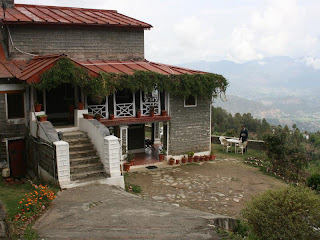Last summer one decided to get away from Delhi for a few days and set course for Kausani. The highway to Moradabad was sheer madness with fearless drivers playing ‘Chicken’ with each other.
 |
| The Chevron Resort, Kausani. |
This is a very popular game in
India and involves two vehicles approaching each other at high speed while
overtaking another vehicle. The aim is to see who has the bigger b***s, and
would hold his line, forcing the other one to swerve at the last moment, with
every chance of hitting another vehicle. This duelling, and the fact that many
drivers have b***s of the same size, along with very small brains, is one of
the reasons that we Indians are the proud holders of the world record for the maximum
number of annual road deaths per thousand vehicles. In this we beat the Chinese,
who come in second place. It is reported that the Indian Olympic Committee wants
this sport to be included in the Olympic Games.
 |
| Rudradhari Falls En-route, Kausani. |
Opting for discretion over valour, we passed Corbett
National Park, bypassed the popular but crowded hill station of Nainital and
arrived at Kausani after a slow scenic drive of 9 hours. The hotel in Kausani,
run by Chevron Hotels was a beautiful cottage with about 12 rooms, set in a lovely
garden, with panoramic views of the Trishul and Nanda Devi range. A welcome cup
of hot tea with ‘Pakodas’, Indian style fritters, comprising a variety of vegetables
coated in a spicy chick pea batter and deep fried, sheer bliss.
 |
| An evening view of the Snowcapped Himalayas. |
We watched the sun
go down, started on our sun-downers. All the cares of the city started receding
in direct proportion to the reduction in the level of the bottle. A simple hot meal
and we retired, tired but happy.
 |
| Alpine Forests at Kausani. |
 |
| The Trishul Massif as seen from Kausani. |
Kausani is a lovely, green hill station, surrounded by thick
pine and deodar forests.
One of its primary claims to fame is that Mahatma Gandhi
spent many months in the town and was so enamored of the beauty, forests and streams
of the area, that he described it as the ‘Switzerland of India’. This may be somewhat
of a hyperbole, but can be attributed to the great man having spent less than a
week in Switzerland. His disciples set up the Anashakti Ashram in Kausani,
which does good work to this day. Kausani’s other claim to fame is that it was
home to Sumitra Nandan Pant one of modern Hindi Literature's great poets. There is a small museum dedicated to him.
 |
| The Nanda Devi Peak. |
To the author, Kausani’s attraction is its unrivaled view
of the Trishul and Nanda Devi massifs, the quiet walks in the wooded forests,
lovely vistas of mountains, forests, tea gardens and rivers. The friendly Kumauni
People who always greet you with a smile and the general unhurried pace of
life. One can spend hours gazing at over 250 km stretch of snow covered
mountains, on any clear morning or evening.
 |
| Bageshwar. |
 |
| Baijnath Temple Complex. |
The one thing that one misses in most small hill stations
is the presence of any sort of restaurant serving local food. In most such
places the visitor is limited to eating in one’s hotel, which offer a limited
but adequate menu. A request to the chef may result in some local delicacy
being prepared, but it’s a bit of a hit or miss.
 |
| Temporal Temple and Eternal Mountains in Juxtaposition!. |
There are many excursions from Kausani. Bageshwar with
its ancient Baijnath Temple Complex is about 16 km away. Pretty mountain towns
like Binsar and Chaukori.
Almora and Nainital, too, are within easy reach but
are crowded and polluted, especially Almora
 |
| Approach to the Nanda Devi Biodiversity Reserve. |
The Nanda Devi biodiversity reserve is also easily
accessible from Kausani and it is possible to access the Pindari Glacier via
Bageshwar.
The Pindari Glacier trek for 6 days is one of the easiest glacier treks in the Himalayas.
The authorities are now limiting the number of the people admitted to these reserves as the influx of humans were causing irreparable damage to the delicate flora and fauna of the area.
 |
| Approach to The Pindari Glacier |
It is quite easy to reach the outer limit of the biodiversity reserve on a day trip, which would suffice for most travellers as not everyone can spend 5 to 6 days trekking. A short visit of the 'Lick and Promise' style, was all that this author had time for.
 |
| Tea Gardens. |
 |
| River, Fields, Forests, Hills & Homes. |
There are some old tea gardens at Kausani. Over the years
these gardens had almost become defunct due to reduced production and un-remunerative
prices. These old China tea bushes are now being revived thanks to some
entrepreneurs from Kolkata and the rise in demand of these flavourful, high
grown, organic teas. The tasting house at the tea garden is a
nice place to
sample and buy these excellent orthodox teas.
 |
| The Lovely Bhimtal Lake. |
Relaxed and content, we set out on the return journey. The
road journey to Delhi is about 400 km, but it may be wise to stop enroute overnight to break it up into two manageable parts.
We stopped over at the scenic Bhimtal
Lake, to savour the mountains for another night. Leaving Bhimtal next morning
and studiously avoiding being inveigled into playing ‘Chicken’ on the road, we
returned to the bright lights of Delhi, already planning our next trip to the
mountains.
 |
| A Dramatic
Telephoto View of The Trishul and Panchauli Peaks and Subsidiary Ranges. |



















